Serendip is an independent site partnering with faculty at multiple colleges and universities around the world. Happy exploring!
Notes Towards Day 4 (Thurs, Jan 26): "Imagining a New Typography"

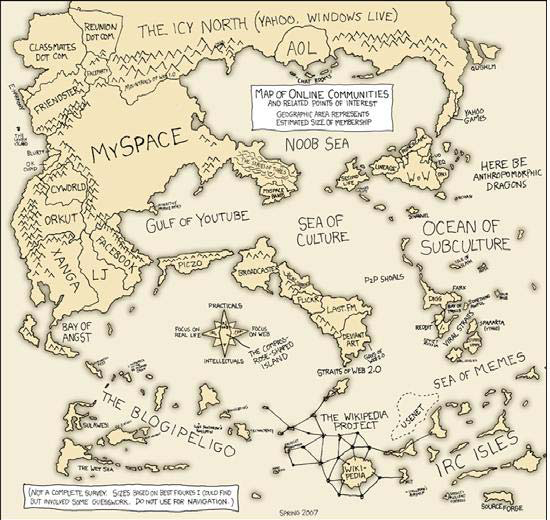
where are you on this map?? where is your academic writing? soon we'll see....
I. coursekeeping:
@ 4:30 this afternoon, in the Phillips Wing, Magill Library, Haverford:
"Applications of Digital Cartography to Digital Humanities"--somebody
please go and report back?!?
verify your conference appointments this week and next (don't stand me up,
AND tell me when you've arrived->-thinking of others, before and after you....)
come @ that sweet spot where you have an idea--and some openness to revising it!
8 p.m. Fri, Feb. 3: first 4-pp. web event, reflecting on
(possible/actual) "breaks" in writing. This could involve
reading an on-line site which represents a "break" in the
writing in your discipline; or examining a social networking site
as a genre (how does it work? what are its characteristics?
what possibilities does it offer for public intellectual work?)
Or you might want to focus on the "breaks" in your own writing,
in light of the generic conventions you've been taught (perhaps
you'd like to create a text for The Breaking Project ?)
for Tuesday, please read the first two chapters, on "Peer Review"
and "Authorship," from Kathleen Fitzpatrick's e-book, Planned Obsolesence,
and also Cassie Kosarek's various web experiments,
Coming @ Poetry from Two Directions;
On the Argument of the Origin/On the Origin of the Argument;
The Role of Fiction in Science, on Tumblr and Facebook;
and Wanderings Pertaining to my English Thesis.
Cassie (and perhaps Clare, aka An Active Mind?) will join us for class.
don't forget to post again by Sunday evening, your reactions/
reflections on this week's conversations, your own writing,
notes toward your paper....?
II. your very rich postings from last weekend:
* what was the experience like?
* use evocative titles: "week 1 post" isn't going draw anyone in!
* on using images and active links
* how do we want to refer to one another? by name or usernames?
("as mentioned by Debbie in class....")
* consider sometimes "adding new comment" on instead of "posting" your thoughts
* reorganized a bit to turn your individual posts into a collaborative conversation!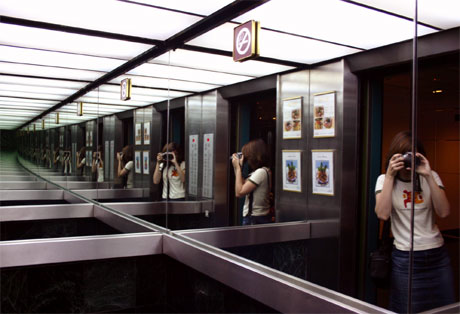
leamirella: I think that the "source" is not limited to just the one piece of material. Instead, it is infinite and can't trace where the source actually begins.
KT: I was thinking ... the laws of thermodynamics ... apply to the creation of new genres and academic writing too. In terms of the infinite regress of source materials, perhaps they are the conserved “energy” and all of our different interpretations ... spread out the sources into something “new”… With the ability to reference so many sources on the internet, our ability to combine, but expand, has increased profoundly ... to make for even greater diversity and boundless creativity.
dglasser: "The cure for the disease called thinking is work" .... Thinking, and over thinking, and then rethinking your over thinking just to make sure your work is based justly, isn't beneficial to anyone. Just write. Just work.
Ayla: it doesn't make sense that artists have come to resent those who plagiarize - those who love the author's work enough to adopt it, maybe change it and bring it into their own work. Lethem's reference to the Velveteen Rabbit makes a good analogy.
kobieta: Academic writing, as I've found this past semester, is not limited to a certain structure; its credibility does not solely depend on the number of sources one quotes from. But rather, it is a genre of writing whose boundaries and borders can conform to whatever you need it to be.
AliciaRamirez: academic writing has been driven by extensive research ...Academic writing may allow writers to present their opinions as long as they do not overshadow the facts.
EGrumer: As an English major, the college essays that I have thus-far written for my field have all been based on other people's work...The style is very detached...I need to write in an unemotional way, basing my statements on quotations and facts ...everything is far more clinical than, for example, the Jonathan Lethem essay ...his tone was far warmer and more informal that both anything I have found myself called upon to write and the vast majority of academic essays that I have read...
Ayla: I found the guidelines for a scientific paper ironically different from those for a college-level paper about a novel.... Whenever I write a scientific journal article, there is a very strict format that I am required to follow .... The movement from paper to digital journals has changed science itself significantly as now hundreds of thousands of experiments are available to researchers across the world...So, future research can be built on ALL past experiments...
froggie315: Writing for biology is formulaic .... I think the idea is to distance the scientist from the science so that the results of an experiment can be pure and True. I enjoy writing like this because the rules are clear and easy to follow .... My comfort with writing for science classes is derived from access to online databases that store science papers. I cannot imagine having to write a lab report without instant access to the entirety of biological research.
Ayla: I never feel safe when writing a scientific paper - I don't feel safe writing anything really. I think a lot of this has to do with the transformation of a database as a genre; how can I include everything when there is so much?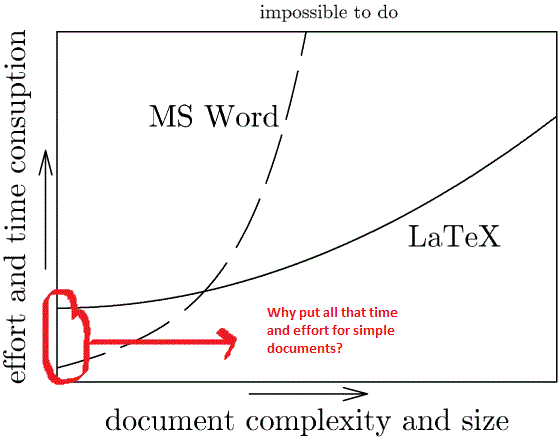
sterrab: writing samples cannot be understood out of a historical or political context at which they were originally written. Whether a science paper is to be published in Scientific American or the Physical Review Letters does create separate genres in scientific writing as a result of the expected audience and their varying technical and science background....the different genres of science writing are distinguished by how they are published for their respective audiences.
vspaeth: College level writing involves a lot of thought. It's a careful process because you have to manage to tie in the ideas of different authors or researchers without stealing from them. The hardest thing, for me, about Academic writing is making sure my ideas haven't been used by someone else.... I get nervous because I feel like everytime I write a paper I need to do incredible amounts of research to make sure nobody has said the exact same thing that I'm saying without me siting them.... I completely agree with the idea that every idea I have is technically plagiarized from someone else .... where do we draw the line between "stealing" and "creating?"
how do you know when you have a "new" idea? when an idea is your "own"?
III. these postings pick up the discussion cut short last Thursday,
when we were looking @ one another's papers -->
get them out to review (esp. the opening and concluding paragraphs....)
* what are the defining characteristics of these papers? (silent board discussion)
* do you recognize the form your partner was using?
* does your partner's paper "signal" to you how to read it?
* what are the clues?
* are you its intended reader?
* how might it be revised to make you one??
* In Lethem, Folsom and Stallybass's terms, how do these papers "think,"
"think with,"or "think against" other forms?
* how "original" do they try to be?
* how much do they rely on imitation, inspiration, the "use of a common treasury"?
* In what ways is it individualized, imitative, collaborative, creative?
[place your/your partner's paper on a this grid, using, if possible,w/ a word from the text]
"individual"<---------------------------------------------------------------------------------------------->"collaborative"
"original"<-------------------------------------------------------------------------------->"using a common treasury"
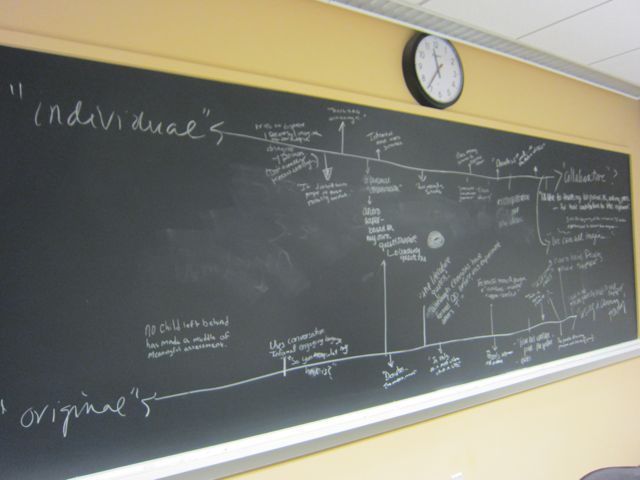
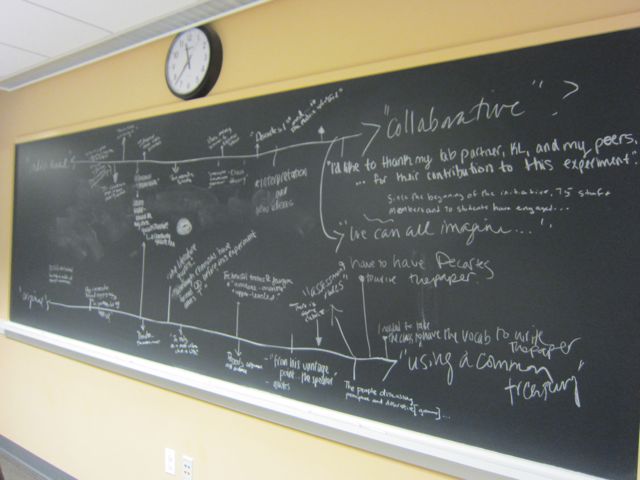
how well does the work you (and your partner) have been
doing fit into the "new typography" described by our readings?
* what would you have to do to your paper (or what would your partner have to do)
to re-work/re-mix it for web publication?
* how interested are you in making a place for yourself/your writing there?
* how interested are you, in particular, in participating in what the Manifesto calls
"co-creation ... teamwork ... the ant colony"?
* could you imagine writing a web paper that way?
(write in response to this invitation, then pass.....)
Dear Peer,
Would you be willing to co-write with me the webpaper that is due next weekend?
Would you place any particular terms or conditions on our collaboration?
Thanks for considering this!
Your peer
IV. Reading Notes
from Kathleen Fitzpatrick, Networking the Field:
"Hi, you may remember me...ahem."
a polemic on catching up
historical resistance to any new mode of communication as deleterious
ways of knowing in flux: shift in forms of information consumption
increase in on-line reading and writing, for a broader audience
Twitter as building community of scholars, audience for longer work
blog not a form but plaform: shape/stage to perform various material
everyone w/ own platform/channel, and we can all subscribe
distinction of reception, response, not publication
crucial step of doing work in the open, for a generally educated public
need to be fluent and able to translate
disrupting our assumptions about how distinction is created
from Fitzpatrick's Introduction to Planned Obsolesence:
a keyword for the humanities: creating a cultural wildlife preserve
political project of shoring up a waning hierarchy
insupportable economic model of publishing
the first academic book is undead: not viable, but still required
zombie logic of contemporary academic publishing: old forms walk the earth...
cf. apparent ephemerality/unexpected persistences of digital text
large-scale synthetic book work still important, but
the system surrounding its production/dissemination has ceased to function
de-center book as gold standard of scholarly production, expand range of acceptable venues
glacial rate of change in the academy: fundamentally conservative nature of institutions
"We Have Never Done It That Way Before"--won't critique own profession/biases
not just technological, but social, intellectual, institutional changes are necessary
begin w/ structure of peer review, @ heart of what makes the academy
backchannel conversation between editor and reviewer that excludes the author, impedes circulation of ideas
turn to pre-publication peer-to-peer review: community-oriented, gift-economy-driven,
making "being helpful part of academic culture,"
letting go of illusion that individual voice is ever alone
each text a "multi-dimensional space in which are married and contested several writings,
none of which is original: the text is a fabric of quotations" (Barthes)
shift focus to open process, exchange of ideas
relinquish control over texts for collaborative work,
let go of originality for editorical/curatorial practices, of highlighting and remixing
otherwise: risk of irrelevance, caught in entrenched systems that don't serve our needs
from the Digital Humanities Manifesto:
* no longer the sole producers, stewards, and disseminators of knowledge or culture, universities are called upon to shape natively digital models of scholarly discourse for the newly emergent public spheres of the present era
* medium-specific features of digital technologies become its core...print is absorbed into new hybrid modes of communication
* Interdisciplinarity/transdisciplinarity/multidisciplinarity are empty words ( ) unless they imply changes in language, practice, method, and output.
* The digital is the realm of the open source, open resources. Anything that attempts to close this space should be recognized for what it is: the enemy.
* a utopian core...without walls
* Its economy is abundance-based .... It values the COPY = COPIA = COPIOUSNESS = THE OVERFLOWING BOUNTY OF THE INFORMATION AGE
* Co-creation ... teamwork ... the ant colony
* expand the compass of the affective range to which scholarship can aspire
* Process is the new god ... iterative ... networks of research ... it honors the steps by meansof which results are obtained as a form of publication
* the increasingly distributed nature of expertise and knowledge
* Wiki-scholarship is iterative, cumulative, and collaborative. Social media are the new laboratories of culture and knowledge making.
* The dichotomy between the manual realm of making and the mental realm of thinking was always misleading .... Today, the old theory/praxis debates no longer resonate. Knowlege assumes multiple forms... all making.
* curation as a central feature ... making arguments through objects as well as words, images, and sounds
* the great diminishers... disciplinary finitude (and the Humanities' infinite work)
* Why defend the very disciplinary structures that emerged in the course of the formation of modern universities in the 19th century even when the intellecutal ground has shifted out from under their feet?
* let's imagine a new topography ... open-ended, global in scope, designed to attract new audiences and to establish novel instititutional models ...a distributed "virtual department" ... weaving together shifting archipelagos of researchers ...
* reinvent the department as a finite knowledge problematic which comes into existence for a limited period
* Digital Humanities as "strategic essentialism"


